Basic information about our organization
• • • • •
Psykedeelit 2025: Challenging Psychedelics
Preliminary information about our conference on October 2–4, 2025!
Would you like to keep updated regarding our events and other activities?
You’re welcome to join our email list!
• • • • •
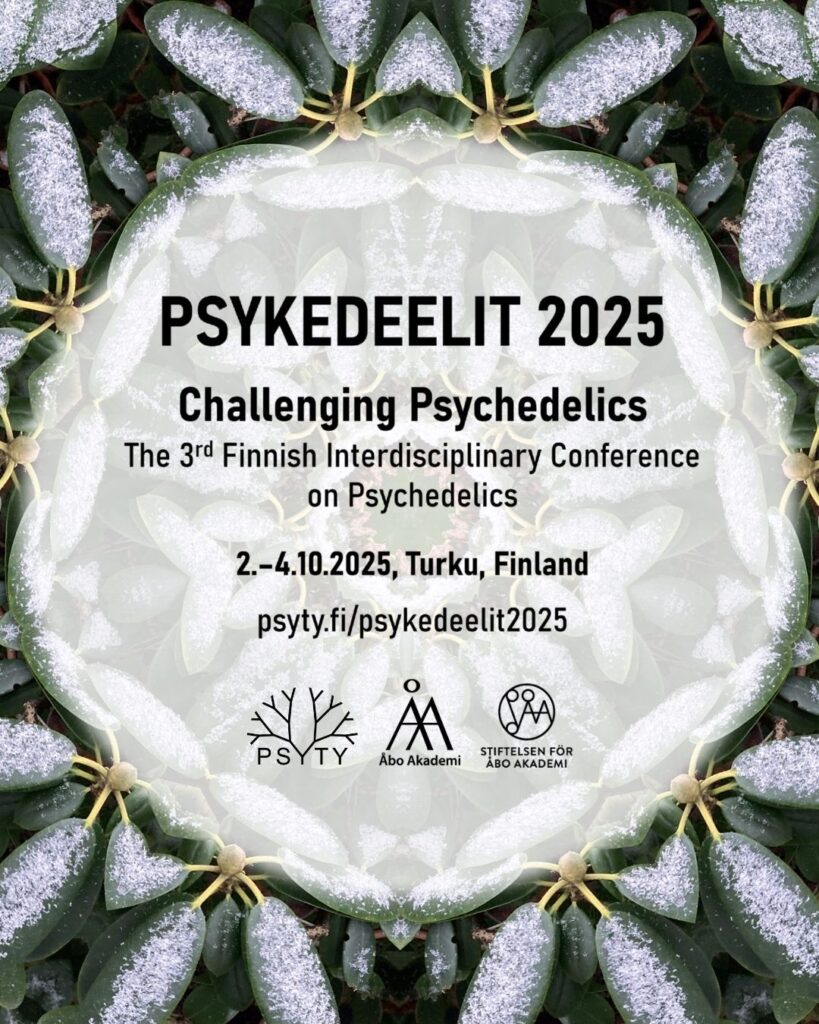
Registration for our Psykedeelit 2025 conference taking place on October 2–4 is now open! There are limited seats and the previous edition sold out, so ensure your place by registering in Psyty’s web store.
The preliminary program for the conference has also been published and is available at the conference page.
The registration fee is 65/40 €. Members who have paid Psyty’s membership for 2025 get a 10 € discount – we’ll email a discount code to members.
More information about the conference here.
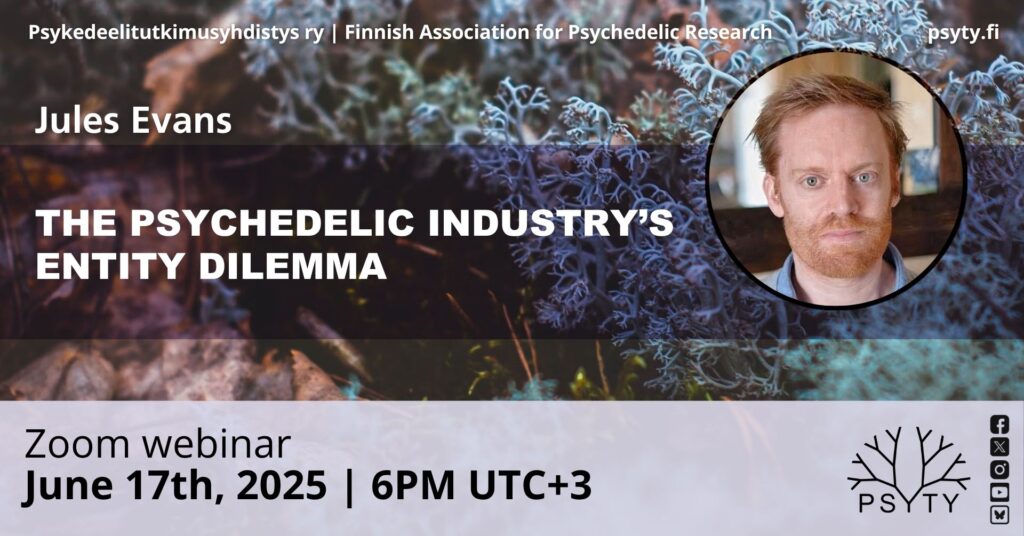
Sometimes, even quite often, people encounter ‘entities’ on psychedelics, which may give them messages, heal them or sometimes seem to threaten them or cause them harm. This presents a dilemma for the budding psychedelic therapy industry and the related field of research regarding informed consent. Don’t mention the entities, and people might express ontological shock at encountering them. Do mention the entities, and people and regulators might very well be put off and not take the field seriously, or even see it as spiritually dangerous.
But precisely what sort of entity encounters do people report? What different attitudes to these experiences has the psychedelic therapy field taken? And what might be a wise approach to this topic, for therapists, guides and industry figures? On Tuesday June 17th at 6PM (UTC+3), we’ll dig into these questions in a webinar lecture by Jules Evans, philosopher, historian and director of the Challenging Psychedelic Experiences Project.
The event contains a Q&A section and the total length is 2 hours.
We offer this webinar as a pay what you can event: you can participate without paying, but by paying, you can help us produce more events like this and ensure that we can keep offering them to people regardless of their financial circumstances.
0 € – register here
5–20 € – buy ticket here
If you pay for the ticket, please also remember to register for the webinar via the registration link!
You can also support us by paying our membership fee for 2025. You’ll find our membership products on the main page of our web store. We also accept donations.
About the speaker:
Jules Evans is the director of the Challenging Psychedelic Experiences Project, a non-profit which researches post-psychedelic difficulties and what helps people cope with them. He is also the editor of Ecstatic Integration, a popular substack exploring psychedelic and ecstatic integration. He is an honorary research fellow at the Centre for the History of the Emotions at Queen Mary, University of London. He’s the author / co-author of four books, including Philosophy for Life and Other Dangerous Situations (2012), The Art of Losing Control (2017) and Breaking Open: Finding a Way Through Spiritual Emergency (2020). He has written and presented for publications including The Times, Economist, Spectator, Financial Times, BBC Radio 4, Audible and Aeon, and he was a BBC New Generation Thinker.
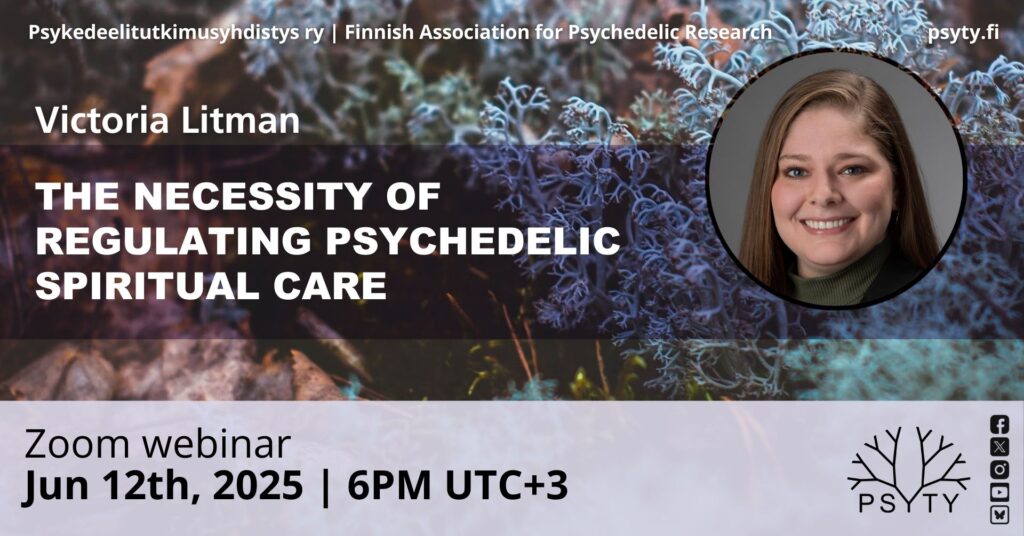
Spiritual or religious elements are a relevant part of the effects of psychedelics. Some people have argued that in addition to the more typical mental health professionals, psychedelic care also needs people who focus on the aforementioned elements – what has been called psychedelic chaplains.
One of the people who has been calling for such an approach is lawyer, law professor, and interdisciplinary psychedelic studies scholar Victoria Litman. In a webinar presentation organized by the Finnish Association for Psychedelic Research on Tuesday June 12th, she will argue that it is ethically necessary to include spiritual care due to the enhanced suggestibility of individuals under the influence of psychedelics. This suggestibility creates a situation ripe for imposition, whether intentional or accidental, of spiritual or religious ideas, which there have already been allegations of. Her view is that ethical psychedelic facilitation requires accounting for this possibility and actively working to prevent it.
Litman sees psychedelic chaplains as playing an important role in informed consent processes, training medical professionals and holding space for participants during psychedelic experiences and helping them integrate those experiences. She argues that including psychedelic chaplains may enhance therapeutic benefits through supporting continued communal engagement after psychedelic sessions. She also brings up an economic perspective: The high cost of providing medical professionals for long periods of time is one of the biggest financial barriers to expanding access to psychedelic treatments.
The event contains a Q&A section and the total length is 1,5 hours.
We offer this webinar as a pay what you can event: you can participate without paying, but by paying, you can help us produce more events like this and ensure that we can keep offering them to people regardless of their financial circumstances.
0 € – register here
5 € – buy ticket here
10 € – buy ticket here
20 € – buy ticket here
If you pay for the ticket, please also remember to register for the webinar via the registration link!
You can also support us by paying our membership fee for 2025. You’ll find our membership products on the main page of our web store. We also accept donations.
Victoria Litman M.Div., J.D., LL.M. is a visiting professor at Roger Williams University School of Law, where she teaches Torts, Cannabis Law, and Psychedelics Law. She is also a Fellow in Psychedelic Law and Spirituality at Harvard Law School’s Petrie-Flom Center for Health Law Policy, Biotechnology, and Bioethics. Her scholarly work focuses on the intersections of tax law, religious freedom, and emerging areas such as cannabis and psychedelics law.
Professor Litman earned an LL.M. in Taxation with Distinction from Georgetown University Law Center during which she was a Graduate Tax Scholar, a JD (cum laude) from New York Law School, a Master of Divinity from Union Theological Seminary (concentration in Religion and Law), and a BA in Religion from the University of Southern California.
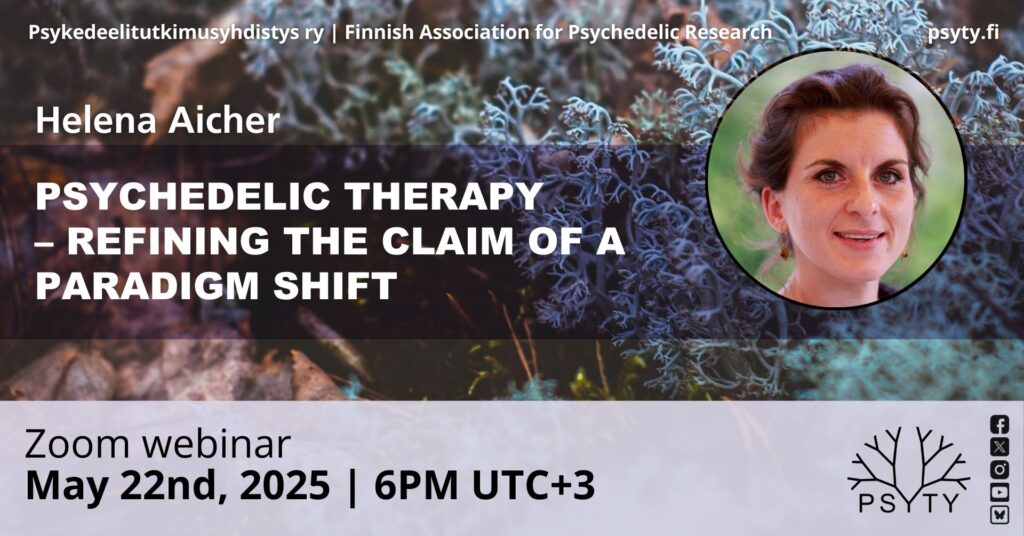
The evolving role of psychedelics in mental health treatment is often referred to as the “psychedelic renaissance” or even a “paradigm shift” in psychiatry. But does this resurgence truly represent a revolutionary change, might it be better understood as an integration of existing therapeutic approaches and perspectives?
On Thursday May 22nd at 6PM (UTC+3), in a webinar lecture organized by the Finnish Association for Psychedelic Research, we’ll dig into this question with Swiss postdoctoral researcher Helena Aicher. The discussion will highlight both the novel and familiar aspects of psychedelic treatments in comparison to traditional therapies. Emphasizing a balanced, bio-psycho-social model, we’ll consider how psychedelics can enhance, rather than replace, existing psychiatric frameworks, advocating for a more nuanced understanding of their place within modern mental health care.
The event contains a Q&A section and the total length is 2 hours.
We offer this webinar as a pay what you can event: you can participate without paying, but by paying, you can help us produce more events like this and ensure that we can keep offering them to people regardless of their financial circumstances.
0 € – register here
5 € – buy ticket here
10 € – buy ticket here
20 € – buy ticket here
If you pay for the ticket, please also remember to register for the webinar via the registration link!
You can also support us by paying our membership fee for 2025. You’ll find our membership products on the main page of our web store. We also accept donations.
About the speaker:
Postdoctoral researcher at the Universities of Zürich and Basel. Helena is involved in several trials investigating psychedelics, mechanisms, and contextual factors. She also works as a psychotherapist including the limited medical use of psychedelics. With her engagement in the Swiss Medical Association for Psychedelic Therapy (SÄPT) she’s involved as a trainer in psychedelic therapist trainings. Helena bridges science and practice, contributing to the development and implementation of psychedelic-assisted therapy.
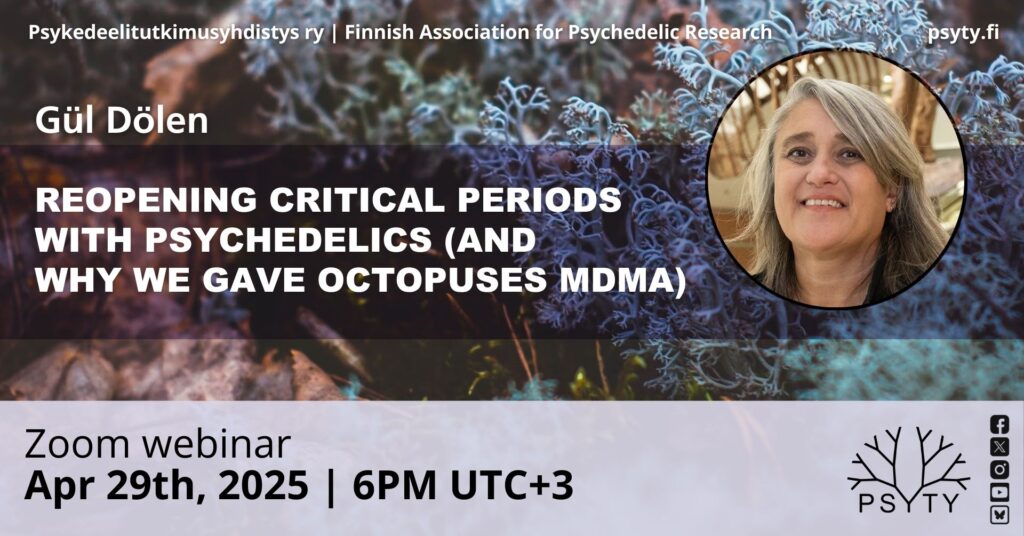
What if the brain’s most sensitive windows for learning and change—once thought to close forever—could be reopened? And what if psychedelics held one possible key for such reopenings?
On Tuesday April 29th 2025 at 6PM UTC+3, in a webinar lecture organized by the Finnish Association for Psychedelic Research, neuroscientist Gül Dölen will share her research uncovering how psychedelic drugs like MDMA, LSD, psilocybin, and ibogaine can reopen critical periods of brain plasticity, particularly those involved in social reward learning. Understanding psychedelics through this framework dramatically expands the scope of disorders (including autism, stroke, and allergy) that might benefit from adjunct therapy with psychedelics.
The session will also provide a look into her lab’s research on psychedelics and octopuses – why octopuses were given MDMA and how they reacted, and how such research can help improve our understanding of why critical periods exist, why they close, and how they might be reopened.
The event contains a Q&A section and the total length is 2 hours. The event is free of charge – you can register here. The webinar will not be recorded.
You can support us in organizing such free events by paying our membership fee for 2025. You’ll find our membership products on the main page of our web store. We also accept donations.
About the speaker:
Dr. Gül Dölen is a Professor and the Renee and Bob Parsons Endowed chair in the Department of Psychology, the Helen Wills Neuroscience Institute, and the Berkeley Center for the Science of Psychedelics at the University of California, Berkeley. Additionally, Dr. Dölen maintains an adjunct professorship in Neuroscience and Neurology at the Johns Hopkins University School of Medicine, where she previously served as an Assistant and Associate Professor. Dr. Dölen earned her M.D., Ph.D. at Brown University and the Massachusetts Institute of Technology (MIT), and completed postdoctoral training at Stanford University. Dr. Dölen is the recipient of several prestigious awards including: the Joukowsky Family Foundation Award, the Conquer Fragile X Rising Star Award, the Angus MacDonald Award for Excellence in Undergraduate Teaching, the Society for Social Neuroscience Early Career Award, the Searle Scholars Award, the Johns Hopkins University President’s Frontier Award, and has been named one of Vox magazine’s 50 Future Perfect.
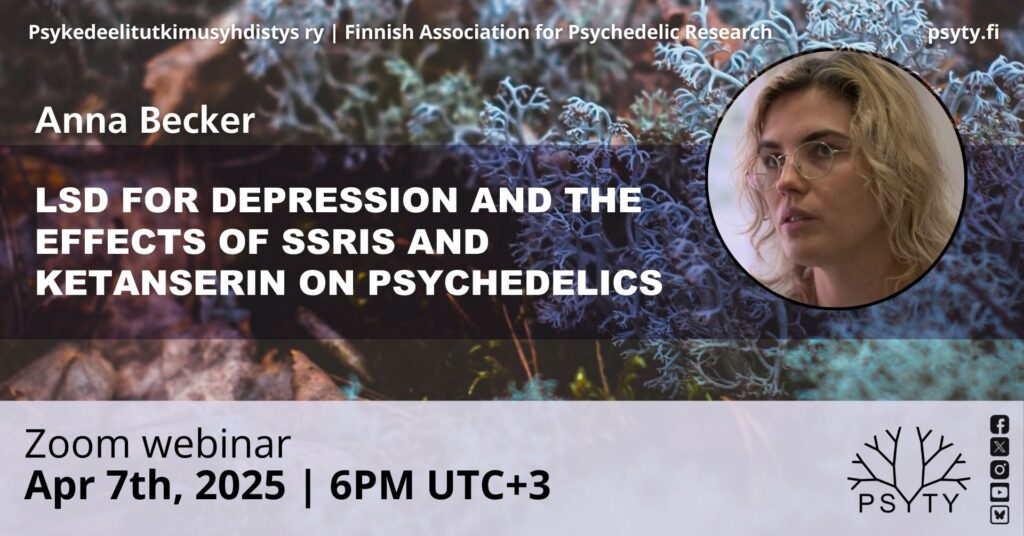
At least in the popular culture of the 1950s and 1960s, LSD was almost synonymous with “psychedelic drugs”. In the current second major wave of psychedelic research, psilocybin has received much more attention than LSD. Two relevant reasons for this are the shorter effects of psilocybin and the negative stigma attached to LSD. But as psychedelic research has become more mainstream, increasing attention has also gradually been given to the study of LSD.
One of the things LSD has recently been researched for is as an aid for the treatment of depression, about which the Finnish Association for Psychedelic Research will organize a webinar lecture on Monday April 7th, 2025, at 6PM UTC+3. In the webinar, psychopharmacology PhD student Anna Becker from the University of Basel, Switzerland, will present her research on the topic. Her work covers both research on the physiological processes related to psychedelics and the psychotherapeutic applications of psychedelics.
In addition to her depression research, Becker will also present her research investigating how SSRI medication, often used for the treatment of depression, and ketanserin, a potent 5-HT2a serotonin receptor antagonist, affect the subjective effects of psychedelics like psilocybin and LSD.
We offer this webinar as a pay what you can event: you can participate without paying, but by paying, you can help us produce more events like this and ensure that we can keep offering them to people regardless of their financial circumstances.
0 € – register here
5 € – buy ticket here
10 € – buy ticket here
20 € – buy ticket here
The event contains a Q&A section and the total length is 2 hours. Please note that while the event will be recorded, this time the recording will only be available to our full members. More about membership types here.
You can also support us by paying our membership fee for 2025. You’ll find our membership products on the main page of our web store. We also accept donations.
About the speaker:
Anna Becker studied Clinical Psychology and Neuroscience at the University of Basel. Since 2020 she has been a PhD candidate in the psychopharmacology research group of Prof. Matthias Liechti at the University Hospital Basel where she investigates the role of 5-HT2A receptor down-regulation and antagonism in the acute effects of psilocybin and LSD. In this function, she has accompanied over 200 psychedelic experiences. She is interested in the basic physiological processes of psychedelics as well as their psychotherapeutic applications. She started psychotherapy training in 2021 and has been working clinically since. Hence, she was able to conduct LSD assisted therapy sessions within the “LSD against depression” phase II study in Basel.
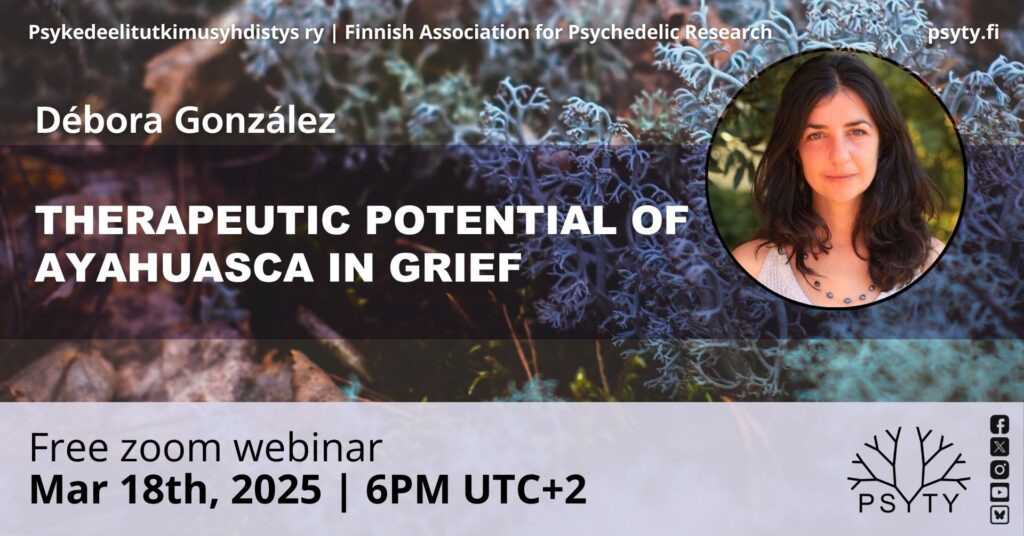
Can ayahuasca be helpful for dealing with grief? This question will be explored in a webinar lecture organized by the Finnish Association for Psychedelic Research (Psykedeelitutkimusyhdistys) on Tue March 18, 2025, at 6PM UTC+2. Drawing from a clinical study with 82 participants, psychologist Débora González will share the principal outcomes of the study. We will explore key insights about how ayahuasca, within a meaning-reconstruction therapy framework, can help find acceptance of death, promote continuing bonds with the deceased, and foster post-traumatic growth.
Dr. González will highlight the mechanisms of sense-making and meaning-making as key therapeutic agents of change in psychedelic therapy. She will also delve into the role of community and nature, offering some reflection on how these elements are relevant in consolidating change in the process of grief within Western culture.
The event contains a Q&A section and the total length is 2 hours. The event is free of charge – you can register here. You can support us in organizing such free events by paying our membership fee for 2025. You’ll find our membership products on the main page of our web store. We also accept donations.
About the speaker:
Débora González is a psychologist and holds a PhD in pharmacology. She currently combines her role as a researcher at the Sant Joan de Déu Foundation (Barcelona) with her position as a professor at Isabel I University (Spain) and as a clinician at Clínica Synaptica (Barcelona). In recent years, she has been dedicated to researching the therapeutic potential of ayahuasca in the grieving process following the loss of a loved one.

Call for Papers
We are excited to announce the launch of Acta Psychedelica, a fully open-access, peer-reviewed, and non-profit journal dedicated to interdisciplinary psychedelic research. Run by researchers in the field, the journal aims to foster rigorous and open scientific discourse on psychedelics. The journal is published by the Finnish Association for Psychedelic Research (Psykedeelitutkimusyhdistys ry).
We now invite submissions for our first issues:
- Special Issue: “What is (a) psychedelic?”
This special issue explores fundamental questions about the definition and scope of psychedelics. Topics of interest include, but are not limited to:
- What qualifies as a psychedelic substance, activity, or experience?
- How should the term “psychedelic” be conceptualized?
- In what ways do psychedelic experiences compare to other transformative states, such as meditation, near-death experiences, or spontaneous awakenings?
- General Call for Papers
We also welcome submissions on any topic related to psychedelic substances and experiences, spanning all fields of research.
Acta Psychedelica is an interdisciplinary journal and accepts submissions from psychology, psychiatry, philosophy, pharmacology, neuroscience, anthropology, sociology, religious studies, theology, and related disciplines. The journal is published on the journal.fi platform used by the majority of Finnish scientific journals, and there are no publication fees.
Manuscripts should be submitted via our online system: https://actapsychedelica.journal.fi/about/submissions
Submission deadline for the special issue “What is (a) psychedelic?” is August 31, 2025. Other submissions are considered continuously, and all accepted submissions are published online ahead of inclusion in issues.
For further inquiries, please contact the inaugural editors-in-chief Jussi Jylkkä (jussi.jylkka@abo.fi) or Aila Mustamo (aila.mustamo@utu.fi).

Attachment theory investigates the role of early relationships in shaping an individual’s later emotional bonds and behaviour. What are its implications for the effects of psychedelics? In a webinar lecture organized by the Finnish Association for Psychedelic Research on Thursday Feb 27th, 6–8PM UTC+2, interdisciplinary researcher Esenia Cassidy will present a talk that delves into the exciting intersections between psychedelics and attachment theory, exploring both the foundational aspects and the novel implications of their convergence.
We will begin by unpacking the fundamental concepts of attachment theory and its key terminology, laying the grounds for a deeper dive into the talk’s topic. From there, we will pivot into attachment-and-psychedelic research up to date, its promise and implications. Next, we’ll focus on a few ongoing innovative theoretical and empirical research projects pertinent to the topic at hand. We will conclude with clinical and real-life applications, followed by an extensive discussion.
This session is designed for both seasoned researchers and newcomers to the field, providing a comprehensive overview of where psychedelic-and-attachment research stands today and where it might head in the future.
The total length of the event is 2 hours. The event is free of charge – you can register here. You can support us in organizing such free events by paying our membership fee for 2025. You’ll find our membership products on the main page of our web store. We also accept donations.
About the speaker:
Esenia Cassidy is an interdisciplinary psychedelic researcher with focus on attachment, gender, trauma, and harm reduction. Esenia is a co-founder of The Psychedelic Humanities Lab at The New School for Social Research and a project lead at the SexTech Lab (NSSR) and the Granqvist Attachment & Psychedelics Lab (Stockholm University). Currently, Esenia is pursuing a doctoral degree in Social Work at the Ohio State University’s College of Social Work. Esenia is an active member of the Center for Psychedelic Drug Research and Education at CSW/OSU and works on the projects that involve gender identity and its relation to psychedelic use, passions for substance use, and challenging psychedelic experiences, among other topics.
Stemming from a background in social justice, education, and media, Esenia’s interdisciplinary approach is rooted in commitment to addressing complex societal issues through diverse innovative research and clinical practice. Esenia earned a Master’s degree in Psychology with a Concentration in Substance Abuse Counseling from The New School for Social Research.
Esenia’s scholarly contributions include Psychedelics, Attachment and Enculturation Dynamics: Premise and Promise (in review), Childhood Trauma, Challenging Experiences, and Posttraumatic Growth in Ayahuasca Use (Cassidy et al., 2023), Psychedelic Harm Reduction and Integration: A Transtheoretical Model for Clinical Practice (Gorman et al., 2021).
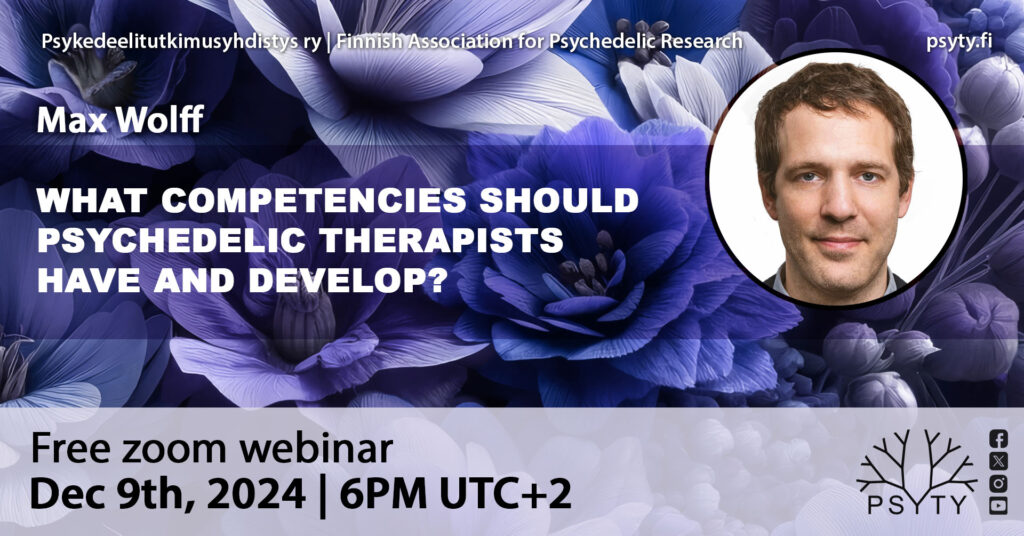
To practice psychedelic therapy safely and effectively, practitioners need a broad range of competences. Many of these overlap with what is needed from regular psychotherapy practices, but there are also psychedelic-specific areas. Psychologist and psychotherapist Max Wolff, who leads MIND Foundation’s Augmented Psychotherapy Training (APT) program, will present on the topic on Monday Dec 9th 2024 at 6PM (UTC+2) in a free webinar lecture organized by the Finnish Association for Psychedelic Research.
The presentation introduces 12 essential competencies of psychedelic therapists that form the basis of the MIND Foundation’s Augmented Psychotherapy Training (APT).
The basic competences include:
- the application of psychotherapeutic concepts, methods and attitudes,
- understanding the scientific and medical foundations as well as
- the cultural and medical history of psychedelic therapy,
- complying with legal requirements and addressing ethical challenges as well as
- existential aspects of psychedelic therapy, and not least
- a learning-oriented attitude toward psychedelic self-experience.
Practical competences include:
- professional communication and cooperation in multi-professional teams and
- the prevention and treatment of harmful effects of psychedelics
- screening and treatment planning,
- psychotherapeutic preparation for psychedelic experiences,
- inducing and accompanying psychedelic experiences in appropriate settings, and
- supporting patients in the integration process and transition to the post-treatment phase.
The importance of these competences will be illustrated with case examples from treatment practice.
The event contains a Q&A section and the total length is 2 hours. The event is free of charge – you can register here. You can support us in organizing such free events by paying our membership fee for 2024. You’ll find our membership products on the main page of our web store. We also accept donations.
About the speaker:
Dr. rer. nat. Max Wolff is a psychologist and psychotherapist. As Director of Research and Training and a board member of the MIND Foundation, he directs its Augmented Psychotherapy Training (APT) program. As a psychotherapist at the OVID Clinic, the MIND Foundation’s clinical partner, he uses an integrative approach with cognitive-behavioral, acceptance-based and emotion-focused elements. As a therapist and researcher, he is involved in clinical studies such as the EPIsoDE study testing the safety and efficacy of psilocybin in treatment-resistant depression at the Central Institute of Mental Health (CIMH) Mannheim and Charité Berlin. His research focuses on the psychological mechanisms and contextual conditions of psychological changes associated with psychedelic experiences, and aims to make knowledge established by psychotherapy research applicable to the practice of psychedelic therapy.
More news on our Finnish news page.
